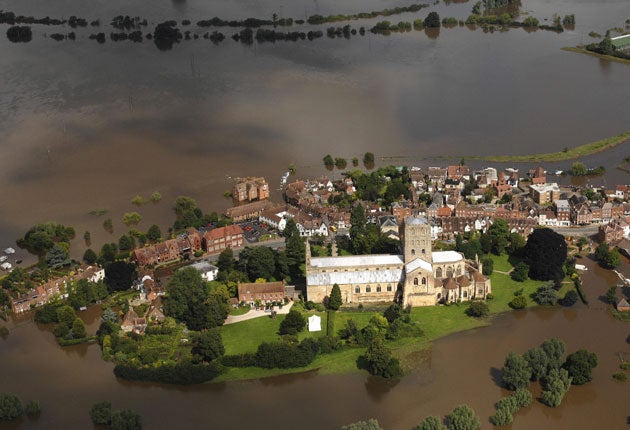£3.2bn: the total cost of 2007 floods
Environment Agency report describes destruction as a 'national catastrophe'

Your support helps us to tell the story
From reproductive rights to climate change to Big Tech, The Independent is on the ground when the story is developing. Whether it's investigating the financials of Elon Musk's pro-Trump PAC or producing our latest documentary, 'The A Word', which shines a light on the American women fighting for reproductive rights, we know how important it is to parse out the facts from the messaging.
At such a critical moment in US history, we need reporters on the ground. Your donation allows us to keep sending journalists to speak to both sides of the story.
The Independent is trusted by Americans across the entire political spectrum. And unlike many other quality news outlets, we choose not to lock Americans out of our reporting and analysis with paywalls. We believe quality journalism should be available to everyone, paid for by those who can afford it.
Your support makes all the difference.The devastation caused by the floods in the summer of 2007 cost the UK £3.2bn, according to a comprehensive report published today.
The flooding, which left 13 people dead, left such a trail of damage and disruption that it amounted to a "national catastrophe", the Environment Agency said. "The scale and seriousness of the summer 2007 floods were sufficient to classify them as a national disaster," the authors wrote. "For many people affected, the floods were a personal tragedy from which recovery is a slow and difficult process."
Most of the costs were incurred by homes and businesses which were flooded when rivers burst their banks after record levels of rainfall. On average, each flooded home suffered between £23,000 and £30,000 of damage, while the cost to the average business was between £75,000 and £112,000.
Wide areas of the country were affected by the flooding, with parts of Worcestershire, Gloucestershire, Oxfordshire, South and East Yorkshire hit hardest. The Agency found that the economic impact was about £3.2bn but could have been as high as £3.8bn.
The cost to homes and businesses was more than £2.1bn, with the rest of the damage being incurred by services such as water supplies and transport links. More than 400,000 school days were lost after more than 800 schools were forced to close. The financial cost of this was put at £11m, but the report said the cost to the children's education was impossible to calculate.
Critical infrastructure and essential services suffered £660m of damage. Water, gas and electricity were the worst hit with costs totalling £325m – the temporary loss of the Mythe water treatment works in Tewkesbury, Gloucestershire, resulted in 350,000 people losing access to fresh water and was described as "one of the UK's worst post-Second World War emergencies".
Damage to roads was put at £191m, with a further £36m caused to rail links. The cost of damaged vehicles was calculated to be £80m. Other costs included £50m to agriculture, largely from crops being inundated and ruined by flood water, and £27m spent by the emergency services and other agencies in coping with the problems.
Up to 48,000 homes were flooded, and in 30 per cent of cases the householders had to move out while repairs were carried out, with one in 10 displaced for more than a year. This disruption to home life was one of the reasons for the cost to people's mental health being estimated at £259m – but the report accepted this was difficult to calculate and said the true cost could be much higher. Calling for lessons to be learnt, the authors noted: "Many of the mental health impacts of flooding were due to people being treated badly by the various companies and agencies involved in flood recovery. Thus, the way in which the recovery process is managed has an effect on the costs of distress."
Robert Runcie, who heads flood risk management at the Environment Agency, said the economic impact of the 2007 floods should act as a warning about the potential costs of last November's flooding in Cockermouth and other parts of Cumbria.
Join our commenting forum
Join thought-provoking conversations, follow other Independent readers and see their replies
Comments